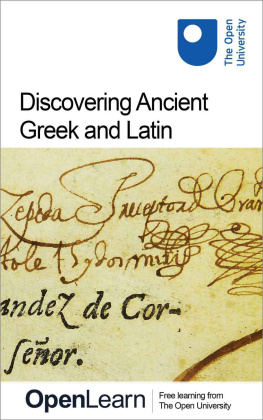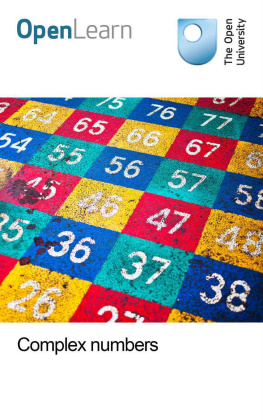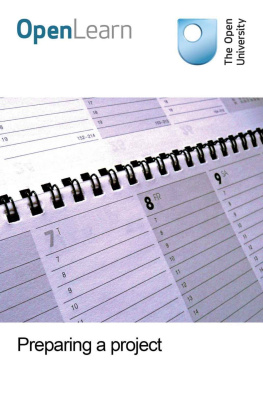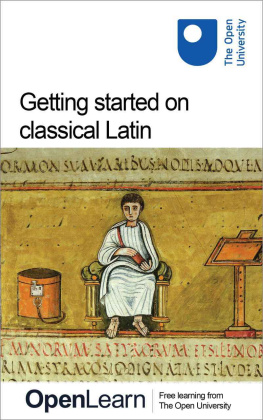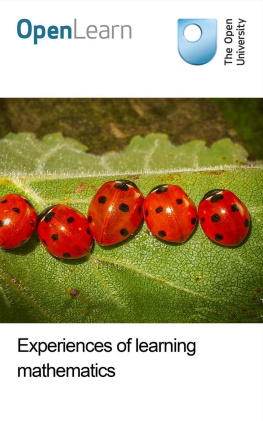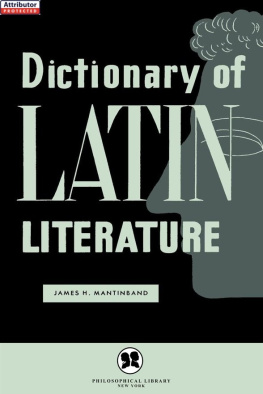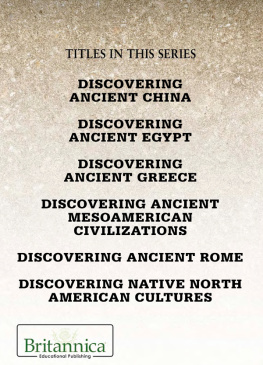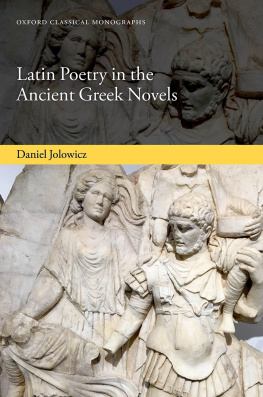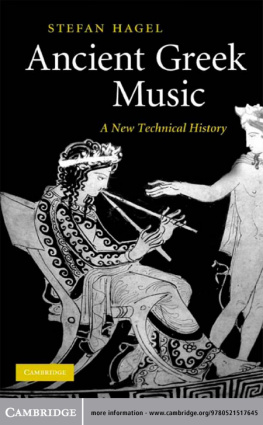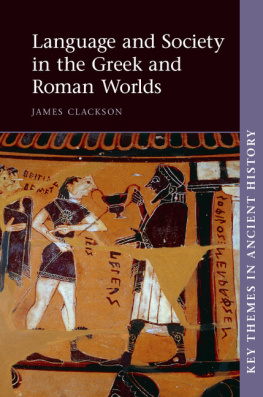University - Discovering Ancient Greek and Latin
Here you can read online University - Discovering Ancient Greek and Latin full text of the book (entire story) in english for free. Download pdf and epub, get meaning, cover and reviews about this ebook. year: 2018, publisher: The Open University, genre: Children. Description of the work, (preface) as well as reviews are available. Best literature library LitArk.com created for fans of good reading and offers a wide selection of genres:
Romance novel
Science fiction
Adventure
Detective
Science
History
Home and family
Prose
Art
Politics
Computer
Non-fiction
Religion
Business
Children
Humor
Choose a favorite category and find really read worthwhile books. Enjoy immersion in the world of imagination, feel the emotions of the characters or learn something new for yourself, make an fascinating discovery.
- Book:Discovering Ancient Greek and Latin
- Author:
- Publisher:The Open University
- Genre:
- Year:2018
- Rating:5 / 5
- Favourites:Add to favourites
- Your mark:
- 100
- 1
- 2
- 3
- 4
- 5
Discovering Ancient Greek and Latin: summary, description and annotation
We offer to read an annotation, description, summary or preface (depends on what the author of the book "Discovering Ancient Greek and Latin" wrote himself). If you haven't found the necessary information about the book — write in the comments, we will try to find it.
Discovering Ancient Greek and Latin — read online for free the complete book (whole text) full work
Below is the text of the book, divided by pages. System saving the place of the last page read, allows you to conveniently read the book "Discovering Ancient Greek and Latin" online for free, without having to search again every time where you left off. Put a bookmark, and you can go to the page where you finished reading at any time.
Font size:
Interval:
Bookmark:
About this free course
This free course is an adapted extract from the Open University course A275 Reading Classical Greek: language and literature: http://www.open.ac.uk/courses/modules/a275.
This version of the content may include video, images and interactive content that may not be optimised for your device.
You can experience this free course as it was originally designed on OpenLearn, the home of free learning from The Open University - www.open.edu/openlearn/history-the-arts/discovering-ancient-greek-and-latin/content-section-0.
There youll also be able to track your progress via your activity record, which you can use to demonstrate your learning.
Copyright 2016 The Open University
Intellectual property
Unless otherwise stated, this resource is released under the terms of the Creative Commons Licence v4.0 http://creativecommons.org/licenses/by-nc-sa/4.0/deed.en_GB. Within that The Open University interprets this licence in the following way: www.open.edu/openlearn/about-openlearn/frequently-asked-questions-on-openlearn. Copyright and rights falling outside the terms of the Creative Commons Licence are retained or controlled by The Open University. Please read the full text before using any of the content.
We believe the primary barrier to accessing high-quality educational experiences is cost, which is why we aim to publish as much free content as possible under an open licence. If it proves difficult to release content under our preferred Creative Commons licence (e.g. because we cant afford or gain the clearances or find suitable alternatives), we will still release the materials for free under a personal end-user licence.
This is because the learning experience will always be the same high quality offering and that should always be seen as positive even if at times the licensing is different to Creative Commons.
When using the content you must attribute us (The Open University) (the OU) and any identified author in accordance with the terms of the Creative Commons Licence.
The Acknowledgements section is used to list, amongst other things, third party (Proprietary), licensed content which is not subject to Creative Commons licensing. Proprietary content must be used (retained) intact and in context to the content at all times.
The Acknowledgements section is also used to bring to your attention any other Special Restrictions which may apply to the content. For example there may be times when the Creative Commons Non-Commercial Sharealike licence does not apply to any of the content even if owned by us (The Open University). In these instances, unless stated otherwise, the content may be used for personal and non-commercial use.
We have also identified as Proprietary other material included in the content which is not subject to Creative Commons Licence. These are OU logos, trading names and may extend to certain photographic and video images and sound recordings and any other material as may be brought to your attention.
Unauthorised use of any of the content may constitute a breach of the terms and conditions and/or intellectual property laws.
We reserve the right to alter, amend or bring to an end any terms and conditions provided here without notice.
All rights falling outside the terms of the Creative Commons licence are retained or controlled by The Open University.
Head of Intellectual Property, The Open University
978-1-4730-0930-1 (.epub)
978-1-4730-1698-9 (.kdl)
You can experience this free course as it was originally designed on OpenLearn, the home of free learning from The Open University - www.open.edu/openlearn/history-the-arts/discovering-ancient-greek-and-latin/content-section-0.
Learn the basics of either Ancient Greek or Latin with this OpenLearn course.
Knowledge of classical Greek or Latin is essential for anyone wanting to get beneath the skin of the cultures of ancient Greece and Rome. This free course provides a taste of what learning Latin and Greek entails by taking you on the first steps of the journey towards learning these classical languages. It has been written with beginners in mind, especially those who have encountered the classical world through translations of Greek and Latin texts and wish to know more about the languages in which these works were composed. If you have looked at a classical text in the original language, you may recognise the gap that can exist between 1) possessing the tools of the trade for reading ancient languages such as a text, a dictionary, a commentary and a translation and 2) actually being able to read the language! The aim of this material is to help you bridge this gap by introducing some of the linguistic skills required to navigate a passage of Latin, Ancient Greek or both.
Note that in this course all Greek is presented twice, first in Greek letters and secondly transliterated into English letters. You can therefore study this material without knowledge of the Greek alphabet. You may, however, wish to acquire some knowledge of the alphabet and pronunciation before you begin, by looking at Introducing Ancient Greek.
If you are interested in the pronunciation of Latin, you may wish to look at Introducing Latin before you begin this course.
Note that references to the Greek language in this course are to Ancient Greek rather than modern.

Figure 1 Brutus coin celebrating the Ides of March, 1st century BCE, RRC 508/3 reverse. The Fitzwilliam Museum, University of Cambridge. Photo: Bridgeman Images
This OpenLearn course is an adapted extract from the Open University course A275 Reading Classical Greek: language and literature.
After studying this course, you should be able to:
- explain why Greek and Latin are referred to as classical languages
- understand some of the distinctive features of Greek and Latin and some features they share in common with other languages
- understand why an English translation cannot represent a passage of Greek or Latin word for word
- contrast the role of word order and word endings in Greek and Latin with those in English
- explain the terms case, declension and (for Latin only) conjugation.
You can experience this free course as it was originally designed on OpenLearn, the home of free learning from The Open University - www.open.edu/openlearn/history-the-arts/discovering-ancient-greek-and-latin/content-section-0.
If you embark on the study of Greek or Latin, what sort of language will you be learning? What are their distinctive features? What do they share in common with other languages?
We can start with one obvious characteristic. Both are referred to as classical languages, a word which seems to endow them with a special status. But what does that really mean? There is no single or simple answer to this question. The attempt to answer it, however, can shed light on important features of both languages. It also leads directly to another central issue for any student of Greek and Latin. What can these languages offer us today and why do they continue to deserve further study?
What does the term classical suggest to you? What do you think it means when applied to Ancient Greek and Latin?
Font size:
Interval:
Bookmark:
Similar books «Discovering Ancient Greek and Latin»
Look at similar books to Discovering Ancient Greek and Latin. We have selected literature similar in name and meaning in the hope of providing readers with more options to find new, interesting, not yet read works.
Discussion, reviews of the book Discovering Ancient Greek and Latin and just readers' own opinions. Leave your comments, write what you think about the work, its meaning or the main characters. Specify what exactly you liked and what you didn't like, and why you think so.

